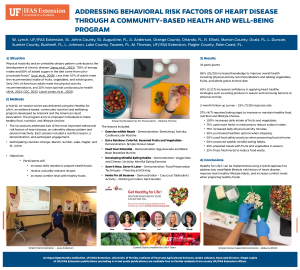2023 Central District All Faculty Symposium – Family and Consumer Sciences
W. Lynch, , UF/IFAS Extension, St. Johns County, St. Augustine, FL, A. Anderson, Orange County, Orlando, FL, R. Elliott, Marion County, Ocala, FL, L. Duncan, Sumter County, Bushnell, FL, L. Johnson, Lake County, Tavares, FL, M. Thomas, UF/IFAS Extension, Flagler County, Palm Coast, FL.
Situation: An unhealthy diet and physical inactivity are two of the “most important behavioral risk factors of heart disease” (WHO, 2023). In the U.S., less than 10% of adults meet the recommended intake of non-starchy vegetables, whole fruit, and whole grains and 76% do not meet the physical activity recommendations (AHA, 2023; CDC, 2022). Methods: Six Family and Consumer Sciences faculty collaborated to present a community-based health and well-being program to promote a heart healthy lifestyle. Workshops included Exercise within Reach, Eat a Rainbow: Colorful, Seasonal Fruits and Vegetables, Feed Your Potential, Developing Mindful Eating Habits, Save it Now, Savor it Later, and Herbs for all Seasons. The program was delivered in a hybrid format. Each county delivered an in-person workshop while providing a virtual opportunity for participants outside of the host county. Through the workshops, participants were taught the skills needed to prepare healthy foods, receive culturally relevant recipes, and increase their comfort level with healthy foods. Each workshop had a live recipe demonstration, exercise routine, or related activity. Results: The series had a total of 33 participants. 86% (25/29) increased knowledge to improve overall health including physical activity recommendations and adding vegetables, fruits, and whole grains to their diet. 65% (11/17) increased confidence in applying heart healthy strategies such as eating produce in season and removing barriers to physical activity. The 3-month follow-up survey results included 57% (4/7) self-reported taking steps to improve or maintain dietary intake and physical activity. Participant actions to support a healthy lifestyle included increasing intake of daily fruits and vegetables, using herbs in meal preparation to reduce sodium intake, purchasing healthier options when shopping, and increasing daily physical activity minutes. Conclusion: A hybrid approach to improving heart healthy lifestyle habits is an effective way to address two modifiable risk factors of heart disease.
 0
0

